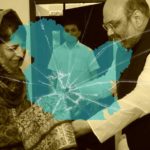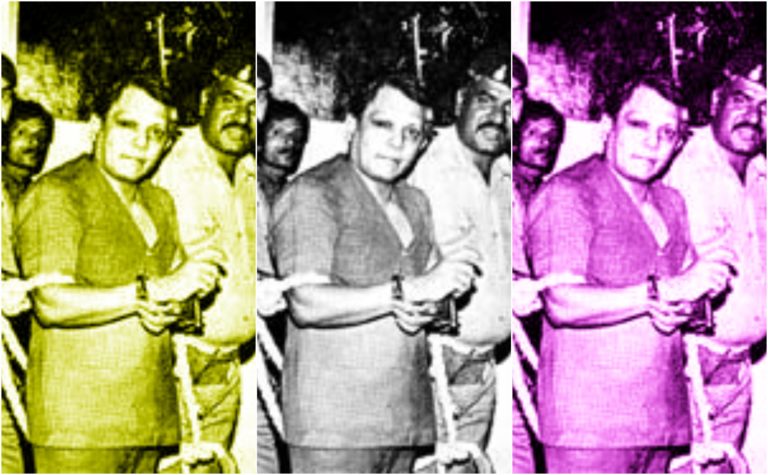A CJM was assaulted just because he raised his voice against police’s ill-behavior.
George Bernard Shaw once said, ‘Anarchism is a game at which police can beat you.’ In the Indian context, Justice Anand Narain Mulla, the poet and a former judge of the High Court of Allahabad had once famously made a statement that is still often used to castigate the ill-deeds of Police. He said –
I say this with all sense of responsibility that there is not a single lawless group in the whole country whose record of crime is anywhere near the record of that organized unit, which is known as the Indian Police Force.
This story, another criminal, a contemptible and sordid example of Police’ notoriety, dates back to 25th of September 1989. It may sound unbelievable today, but Gujarat Police had brutally beaten and handcuffed an incumbent Magistrate, for making regular complaints against the ill-conduct of the police officials. This issue had then caused a huge national uproar forcing the Supreme Court to intervene in this matter. Several Bar Associations had passed Resolutions and went on strike. The Delhi Judicial Service Association, the All India Judges Association, Bar Council of Uttar Pradesh, Judicial Service of Gujarat and many others had approached the Supreme Court using telegrams as well as petitions under Indian Constitution’s Article 32 to save the dignity and honor of the judiciary. Finally, the Supreme Court had taken cognizance of this matter on 29th of September, 1989, four days after the incident. It issued a notice to the Gujarat state and the concerned police officials.
The real story behind the incident
There is a town named Nadiad that falls under Kheda district of Gujarat.
During those days, Inspector S.R Sharma was posted at the Nadiad Police Station. He had a service experience of around 25 years. In October 1988, N.L Patel was posted as the Chief Judicial Magistrate of Nadiad. The CJM soon started realizing that the local police had not been cooperating with him in effecting service of summons, warrants, and notices on accused persons. This non-cooperation was leading to delay in the trial of cases. He complained against the local police’ conduct to the superior police officers, including D.G. P, but nothing substantial happened.
These accounts strained the relationship between the then inspector S.R Sharma and CJM N.L Patel. As a result, the inspector withdrew the police constables posted in the CJM Court. In April 1989 Patel filed two complaints with the police against Sharma and other cops from Nadiad for delaying specific court-related processes. On 25 July 1989 Patel directed the police to register a criminal case against 14 persons who had obstructed judicial proceedings but subsequently since they tendered an unqualified apology, the CJM directed the police Inspector to drop the cases against those persons. Sharma reacted strongly to Patel’s direction. He approached the District Superintendent of Police and filed a complaint against the CJM to the Registrar of the High Court.
On 25th of September 1989, Inspector S.R. Sharma met Patel, CJM in his chamber to discuss the case involving Jitu Sport where the Police had failed to submit charge-sheet within the 90 days period. During the discussion, Sharma invited the CJM to visit the Police Station to see the papers and said that his visit would mollify the sentiments of the police officials. At 8.35 PM Sharma sent a police Jeep at Patel’s residence and Patel went to the police station in the vehicle. When the CJM arrived in Sharma’s chamber in the Police Station, he was forced to consume liquor which he tried to resist. On this resistance, the CJM was assaulted, handcuffed and tied with rope by Inspector Sharma and other police personnel. Later on, he was sent to Hospital for medical examination, in a handcuffed state, and the police intentionally made him sit in the veranda of Hospital for half an hour, exposing the CJM in that condition to public gaze. The police asked the press to take photographs of the CJM while at the hospital. The pictures were published in ‘Jansatta’ on 26th of September 1989.
After the matter reached the apex Court, these police officers, contended the authenticity of the CJM’s account. To establish the facts, the Supreme Court appointed Justice R.M Sahai, the senior judge from Allahabad High Court to investigate the matter. He submitted a 140-page detailed report to the Court that was again contended by these police officials, but the Supreme Court didn’t find any merit in their objections. Finally, this report and its findings were accepted by the Supreme Court as authentic, and the case against these police officials proceeded.
The Supreme Court also found that the District Superintendent of Police had been hand in glove with Inspector Sharma by giving him a free hand and not taking any action against him on the complaints of CJM N.L Patel. It also made specific adverse remarks against the then D.G.P of the state K. Dadabhoy and expressed deep resentment over his indifferent attitude towards the incident. The Court recommended departmental action by the State government against the D.G.P.
The Supreme Court convicted Inspector S.R Sharma and sent him to simple imprisonment for six months along with the DSP, D.K Dhagal, who was pronounced guilty and sent to simple imprisonment for one month. Other accomplice police officials too were convicted and jailed.
In the end, the Supreme Court noted that it doesn’t approve the CJM’s conduct in visiting the Police station on the invitation of Inspector Sharma. The honorable court suggested judicial officers refrain from such visits unless officially important, that too under intimation to the District and Session Judge.
The Supreme Court in this case also issued strict guidelines to be followed by the Police for detaining and arresting a judicial officer.
And, do you know the most exciting part of the story? Do you know who had defended those Police officials in the Supreme Court? The defender was none other than legendary Fali S. Nariman, who in November last year had addressed an august gathering that included former President Pranab Mukherjee too, at the Constitution Club in New Delhi, where he is reported to have said that, ‘For Lawyers and Judges, these are difficult times.’
Further, Read More:
A Fly and Fall of concept of ‘Public Interest Litigation’
Matter-Of-Fact: The Reluctance By State Govts For Police Reforms



